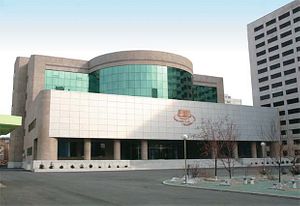It has become more evident that North Korea is increasing efforts to nurture and promote its science sector in a move to have more options to overcome mounting pressure amid international sanctions.
Pyongyang offers different types of benefits to scientists, including a discount program for them at the flagship Mirae Department Store. It is also currently nurturing scientists through about 130 government-backed organizations under the Academy of Sciences, providing not only economic benefits but also academic support from the central government.
These efforts have been mostly focused on government-led projects and investments. Now a new group of players is joining hands to promote scientific progress: North Korean universities.
It is widely known that universities in North Korea attract the country’s brightest and most talented students – at least those with good connections and family backgrounds. The North Korean government appears determined to make the most of this talent pool in its journey to nurture the science sector.
One of the latest examples comes from a specialized university based in Pyongyang. North Korea’s state-run Rodong Sinmun newspaper reported on June 23 that Pyongyang Computer University has decided to transform one of its existing departments into a department specializing in artificial intelligence. The university was launched on September 1, 1960 as the Pyongyang Higher Physics School, aimed at training high-end technical personnel in the computer and IT sectors.
The new move to set up an AI department is in line with the trend of training talents for information technology. The government has set a goal to advance the education system and raise the quality of subjects accordingly, the paper said.
Rodong Sinmun also explained that the university is taking active measures to make improvements in education on artificial intelligence, reflecting the fact that AI is becoming a key technology in the information industry.
The paper added that the university views the development of a continuous education system from undergraduate to doctorate as the key to fostering talent. It has also revamped the system to connect the curriculum from undergraduate, masters, to doctorate courses.
Pyongyang-based Kim Chaek University of Technology, one of the most prestigious universities in the North, has also established a new science institution, which studies, develops, and produces high-tech products.
“The completion of the Science and Technology Institute will create another high-tech product development base that will foster creative science and technology talents with high exploration and application skills to drive the socialist self-reliant economy and vigorously promote the development of science and technology,” Rodong Sinmun said.
President of Kim Chaek University of Technology Hong Seo-hun pointed out that North Korean universities should improve themselves as research-focused and oriented institutions in order to become top-notch universities in the world. To this end, he said, universities should foster more creative science and technology talents.
As much as the North Korean government and universities want to foster and improve the environment for students, they also want to make sure their money and efforts are well spent.
Pyongyang University of Machinery’s new student evaluation system is an example. North Korea’s propaganda website Arirang-Meari reported that Pyongyang University of Machinery has developed and introduced a student performance evaluation system that objectively evaluates students’ skills.
The new system is tailored to students’ ability to evaluate their creativity and performance. The website also explained that both teachers and students can take advantage of this new system, adding that the system is designed with the trend of modern educational development, ensuring fairness in its assessment.
It also said that a comprehensive evaluation of the level of teachers in charge of subjects can be conducted based on real-time student performance assessment data.
The new student performance evaluation system is being introduced at dozens of universities across the country.
Whether or not North Korea’s efforts have paid off is still an open question. Seoul-based National Research Foundation of Korea noted in one of its latest papers that there has been no obvious significant leap forward in North Korea’s scientific research in the last five years.
In contrast, Lee Choon-geun, a senior researcher at Science and Technology Policy Institute, believes that such efforts have paid to some degree. As an example, Lee cited the North’s increasing use of self-developed software for computers and mobile devices instead of depending on software developed in China.
North Korea’s efforts are still underway and will only become more and more visible.

































